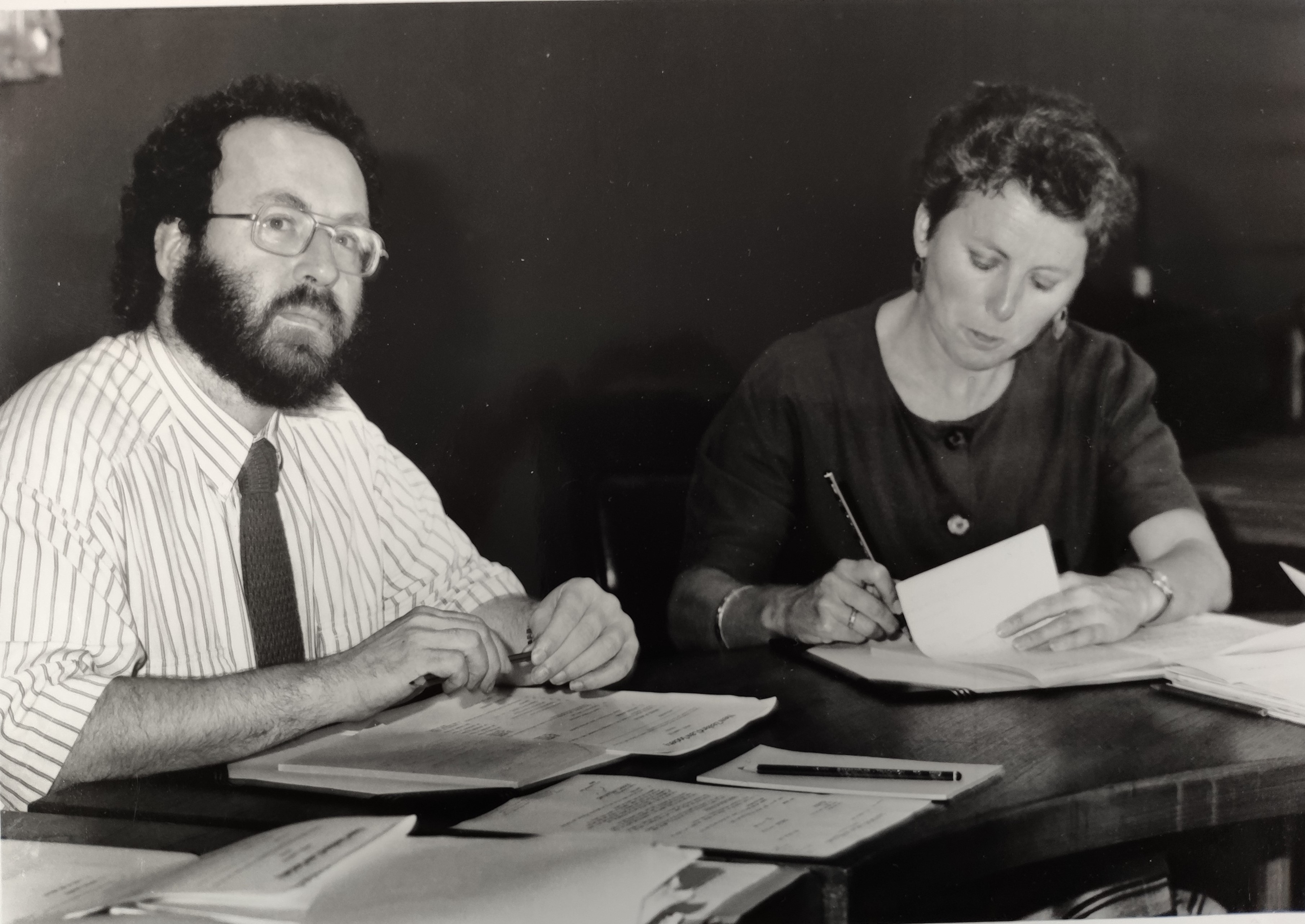A confusing start but 30 years on librarian is still here
Robin Anderson started as a Law Society librarian figuring out where the books should go. Now he reflects on 30 years of being the Law Librarian in Wellington.

Robin Anderson started as a Law Society librarian figuring out where the books should go. Now he reflects on 30 years of being the Law Librarian in Wellington.
By Craig Stephen
Robin Anderson admits he wasn’t entirely sure what he was doing when he first started as Law Librarian with the then Wellington District Law Society 30 years ago.
It was, he says, like jumping in feet first.

“It was all very confusing, at quiet times I would wander around shelving the books trying to figure out where everything was. It was a very old, cramped library where books were put where they fitted rather than where they would logically be. It took me about six weeks to become familiar with all the different law reports, journals, and books. We had unreported judgment collections stacked in boxes. I had done some legal research in Parliament but that was different to what the Law Society was doing,” he says.
He soon became accustomed to the library, and this week Robin is celebrating three decades of being the New Zealand Law Society’s Wellington branch’s Law Librarian.
His route into a career in libraries was triggered by a youthful love of books. But his career initially looked to having a distinct Gallic flavour.
“I did a degree in French at Auckland University and then applied for a position as an English language assistant in France.”
While waiting to hear about that role Robin landed a job as a library assistant in the University of Auckland Library. “It was a fairly basic job, shelving books and filing issue cards, but I really enjoyed it.”
To his immense surprise he landed the English language post and headed off to France. Ironically, the friend who encouraged him to apply for one of the roles, didn’t get taken on. Initially, he worked in Toulouse in the south of the country before moving to Paris, and stayed in France for five years.
The lure of library studies in New Zealand pulled him back to this side of the world, and he gained a post-graduate diploma in library studies at Victoria University of Wellington 1984.
That gained him a job at the Parliament library where he stayed for three years.
“Then this job (at the Law Society) came up, and I thought ‘oh, I really like that’, but it needed staff management experience and all that sort of thing, and I realised I didn’t have any of that.”
So, instead he went for the role of deputy librarian at the then Department of Justice. Three years into that role the Law Librarian role at the Wellington District Law Society came up again, and he began work on 24 September 1990.
At the time the law library was located in the Old High Court, now the back of the Supreme Court. The remnants of that library are still used as an overflow library. But in 1993 the NZLS moved the library to the side of the High Court where it remains today.
Like most occupations, with technology developing at an incredible rate, the role of a librarian has changed considerably over the years. Back in the 1990s the world was still grappling with what now appears to be arcane working methods.
“It was a lot slower back then, we used paper and fax. The library offered exactly the same services in the sense of research and sending out case law and journal articles, but it was much slower as it was sent out by fax or post.”
Email was introduced in the mid-90s though not many other people had accounts at the time. The NZLS was at the forefront of email in New Zealand. Helga Arlington, his equivalent in Auckland, and Robin were among the 200 people chosen to be part of the trial for non-university email conducted by Telecom New Zealand.
“We were right there at the beginning of it, and there was the development of Windows-style interfaces because the internet at that time was only just getting mosaic,” Robin says.
“When I started practitioners still took bound volume cases into court, they didn’t take photocopies or anything like that, and the judge would’ve had a set of books on his desk. It was really book-based.”
In the early 90s the beginnings of the IT system that lawyers now rely on was kicking in. Robin says the LINX database was the first database for practitioners to use but with very limited access, and Lexis online searching was available but only on dial-up and was expensive. There was also access to legal databases such as Briefcase which again was dial-up accessible.
While technology has improved considerably over the past 30 years with most cases now online, that doesn’t mean librarians can allow technology to do its thing.
“You still have to know what the databases cover, where it can be found and so on. There are a lot more tools to learn nowadays and so you need to be familiar with as many of them as you can. It’s the same in most walks of life, if you started out in, say, journalism 30 years ago, you would have adapted to all the technological and other advances in the profession,” Robin says.
Away from books librarians have to deal with life’s quirks, such as waking up lawyers who’ve fallen asleep on sofas, and scooping up confidential client papers left around by careless practitioners. And there’s also those needing reminding that it’s a quiet zone, or that their cellphones shouldn’t be on.
Some lawyers have asked Robin if they could ferret their high-profile client through the library to avoid the media scrum waiting for them at the front of the High Court. That’s been made harder now because of updated court security measures limiting access between the two parts of the same building, while the media had also twigged at this semi-secret escape route.

The library staff — Robin, Julie Matthews, Nicola Stedman and Julie Kirkland — have happily received flowers, chocolates, bottles of wine as appreciation for their hard work, which once included a sideline in dog-watching when its practitioner owner was in court all day.
“We get less of that now, this place is much more of an office; people come in to do some work, sometimes to get themselves sorted early on for a case that might begin about 10am and sit somewhere quietly. And it’s the same during adjournments.”
The library now has 24-hour access through a keycard system so there’s no limit on the times lawyers and other legal professionals can come in to do their research.
While some lawyers can occasionally be stroppy, Robin says family members of new graduates have sometimes been the biggest bother over issues with graduation wear which the branch would lend out for admission ceremonies.
“We had a few parents who were managing their daughter’s or son’s admission and would be demanding ‘where’s the wig, where’s the gown, I need it now’ but if we don’t have those things we can’t hand them over. There’s been a couple in particular who were very unpleasant to us.
“What they didn’t realise was that we were doing it as a service, we weren’t charging for it, it took the whole day and these people were yelling at us, so in the end I decided that it was not worth our stress and strain to continue to do it. And so the Wellington branch took over the service.”
The library still retains some gowns for out-of-town lawyers who are appearing in court in Wellington and don’t want to bring their own on the plane.
The staff also had to deal with the massive Kaikoura earthquake in November 2016 which activated the library’s sprinkler system, damaging many books. All the books were removed and taken to a document warehouse in Porirua where they were assessed for damage and dried out.
As part of the remediation of the whole courthouse complex, the library lost the second floor. A new shelving system – bolted to the floor and braced against further earthquakes – had been installed by November 2017 and the books were returned by Christmas.
Robin maintains that law libraries are still essential for the legal profession despite the march of technology over the past few decades.
“Not everything is for free and not everything is available online, so if a lawyer wants to look at the latest edition of Chitty on Contracts you’ve either got to buy it which is costly ($1,374 at one site) or buy the electronic edition which is several hundred dollars or you can come down here and look at the copy the library has bought for everyone to use.
“When you start doing research on cases in the Court of Appeal or on unusual issues or issues that haven’t been looked at for 10/20/30 years you need more resources. You can’t just rely on Mr Google, because what Mr Google produces is only a small segment of what you need to know. And also our job is to carry out research and to find things so it’s usually easier and cheaper for lawyers and firms to send us a list of things to be copied.”